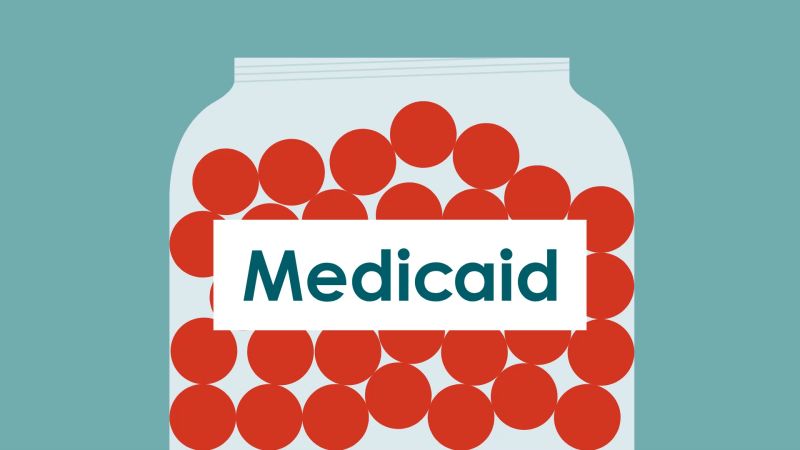CNN
—
As part of their effort to pass a massive tax, immigration and spending cuts package, House Republicans are eyeing plans to shave billions from the federal budget. Some of those cuts could affect Medicaid and the related Children’s Health Insurance Program, which nearly 80 million children, senior citizens, people with disabilities, parents and adults without dependents rely on for critical care.
Most US adults say they don’t want to see decreases in Medicaid spending, according to a recent KFF poll.
It’s not clear yet what changes, if any, would be made to the programs. Those decisions will be made in meetings on Capitol Hill, but Republican lawmakers voted to pass a budget blueprint in April that gave the House Energy and Commerce Committee instructions to shave $880 billion in funding from programs in the committee’s jurisdiction. Medicaid is one of those programs.
GOP leaders have said they want to eliminate waste, fraud and abuse. It’s uncertain, however, whether Republican lawmakers could achieve the topline level of cuts that have been proposed without affecting benefits.
More than 60 House Republicans represent districts with higher-than-average Medicaid enrollment, according to a CNN analysis of Medicaid enrollment data and 2024 election results.
While most Republican districts aren’t heavily reliant on the program, Speaker Mike Johnson’s historically tight margin in the House means that he can only afford a handful of Republican “no” votes to pass any changes to Medicaid without Democrats’ help.
Just 29% of Republican districts have higher-than-average Medicaid enrollment rates, compared with more than half of districts represented by Democrats. That’s due, in part, to the fact that the 10 states that have not chosen to expand Medicaid lean red (with the exception of Wisconsin where the GOP-controlled legislature has long blocked expansion). Nearly 40% of House Republicans represent those states.
Most of the lawmakers on the Energy and Commerce Committee considering any changes to Medicaid represent districts with relatively low Medicaid enrollment rates, compared with all other House districts, CNN found. Nearly three-quarters of committee Republicans and more than half of committee Democrats come from districts that fall below the nationwide district average.
Their colleagues will be watching closely — especially those who represent high-enrollment districts and those who won by close margins in November.
CNN’s analysis found that 49 of the 64 GOP lawmakers representing districts with high Medicaid enrollment won their races by a wider margin than President Donald Trump did in the 2024 election — raising questions about how much appetite there may be to implement cuts to the program.
Among those 64 Republican lawmakers who represent high-enrollment districts, five of them won their races in November within a tight 5-point margin: Reps. Nick Begich (AK-AL), Juan Ciscomani (AZ-6), Ken Calvert (CA-41), Jeff Hurd (CO-3) and Rob Bresnahan (PA-8).
Republicans representing districts with high Medicaid enrollment rates could face more pressure to break from party lines on a vote to cut funding for the program — particularly those who won in close races last year and those who outperformed Trump, including those who ran as moderates. A group of moderate House Republicans — including Bresnahan, Ciscomani and Hurd — reminded House leadership in a letter that they “helped to deliver a Republican Majority” and would not support a bill that included cuts to Medicaid benefits.
“We cannot and will not support a final reconciliation bill that includes any reduction in Medicaid coverage for vulnerable populations,” they wrote on April 14.
About half of the dozen lawmakers who signed the letter represent higher-than-average Medicaid populations and almost all of them won their districts by a wider margin than Trump did in November.
Bresnahan and Ciscomani had previously joined four other Republican members of the Congressional Hispanic Conference in signing a letter to Johnson in February warning against cuts to Medicaid. Bresnahan also issued a statement in response to budget reconciliation negotiations, saying, “If a bill is put in front of me that guts the benefits my neighbors rely on, I will not vote for it.”
There are also a number of GOP senators who have expressed concerns about backing any proposal that fundamentally reshapes or cuts Medicaid benefits, including Sen. Josh Hawley who said earlier this year, “I am very skeptical about cuts to Medicaid that result in any benefit cuts.”
“I don’t want any benefit cuts. If somebody has ideas for reforming the system, I’m open to that, but that had better not be code for benefit cuts,” he told CNN in February.
Senate Republicans currently hold a 53 to 47 majority.
New Mexico and California, each represented by two Democratic senators, lead the country with the highest enrollment rates as of November 2024. A third of constituents represented by two GOP senators, though, have higher-than-average Medicaid and CHIP enrollment rates, according to CNN’s analysis.
Of all states with two GOP senators, Alaska has the highest enrollment rate, ranking fourth nationwide, as of December 2024 — with one in three residents enrolled in the program for health care. Sen. Lisa Murkowski has pledged to protect access for Alaskans and fight cuts to the program.
Louisiana, represented by Republican Sens. John Neely Kennedy and Bill Cassidy, also ranks in the top five states with the highest Medicaid and CHIP enrollment rates.

